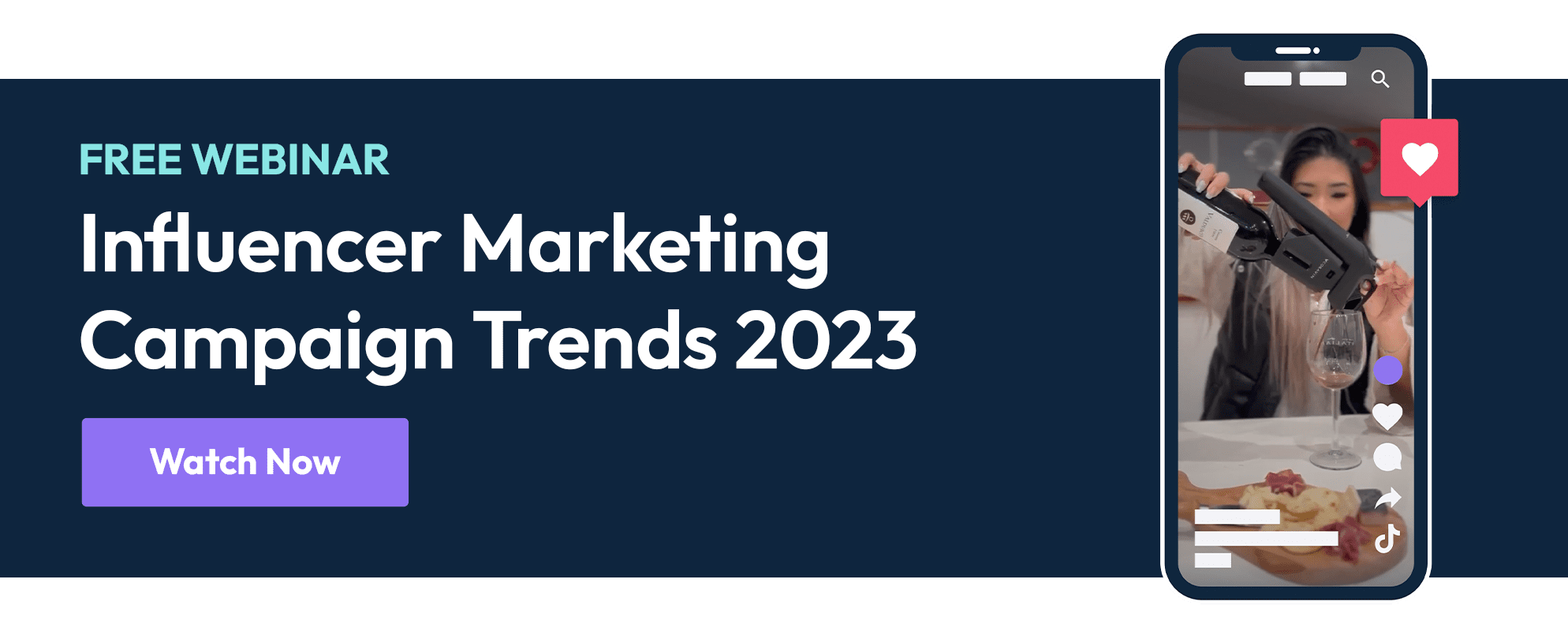
The past year has been quite a major one for influencer marketing. From data privacy updates to a skyrocketing social commerce space, it’s clear that influencer marketing is being forced to evolve to the world around it, and as the field evolves, your marketing strategy needs to as well.
We know that’s no small task, so we summed up what we think will be the top influencer marketing trends and predictions for 2022 to kickstart your strategy.
Trend: Data Privacy Crackdowns Continue
Between Apple’s iOS 14 privacy updates, Google’s plan to eliminate third-party cookies and Facebook’s removal of ad targeting categories, 2021 has been quite a year for data privacy. Consumers are increasingly concerned about their privacy online, and it’s resulting in sweeping changes (and ramifications) that are likely to continue into 2022.
These changes are a win for consumers, but can make it harder for brands and marketers to target based on specific demographics and drill down into reporting.
Prediction: Influencer Marketing as a Targeting Alternative
With data privacy restrictions growing and impacting ad targeting, brands are going to have to get creative to reach their desired audience in 2022, and for this, influencer marketing will emerge as an alternative.
Content creators have already cultivated dedicated communities around their personal brands, and each audience has unique traits that bind them together. Maybe it’s a mutual enjoyment of popular media, shared interests and hobbies, a certain desired lifestyle or even geographical location. Whatever it is, they’ve earned the followers they have for a reason and know what content resonates with them.
If paid ads are no longer letting you target consumers that best fit your niche, seeking out creators occupying a similar space and reaching out to them for partnerships can offer a solution.

Trend: Social Commerce Tools Will Keep Growing
2021 saw the birth of many social commerce tools, from Instagram’s new Shopping from Creators to the TikTok Shopping pilot test. This trend shows no sign of stopping in the new year, as social platforms continue to integrate shopping into the in-app user experience. Expect more tools for brands to begin rolling out in 2022, and check out the links above for tips on how to prepare for each feature.
Prediction: Social Commerce and Influencer Marketing Will Blend
With so many emerging social commerce tools focusing on influencer involvement, it’s likely the two will begin to converge. Creator tools like product tags and Instagram Affiliate indicate that social commerce will continue to expand, for both brands and creators. Ultimately, these two marketing tools will blend into one overall marketing strategy and drive more success together than they otherwise would individually.
Trend: Authenticity Is Replacing Star Status
These days, consumers care more about authenticity than celebrity, and it turns out they’re really good at differentiating the real from the phony. A-listers with massive followings have gotten a bad rap, thanks to some spotlighted snafus that left consumers feeling betrayed.
These kinds of inauthentic promotions gave the word “influencer” a negative connotation to consumers and brands alike.
On the other hand, modern-day content creators and micro-influencers grow their audiences because of their authenticity, and by only endorsing products they actually use or enjoy. This kind of honesty attracts engagement and keeps creators influential to their audiences. That's why working with authentic creators will be key to running successful influencer marketing campaigns in 2022.
Prediction: Consumer-to-Consumer Marketing Will Replace Influencer Marketing
A lot has happened in the world, and online, since influencer marketing as we know it came to be. The global pandemic represented a major shift in the way consumers interact online, on social media, and discover and purchase products.
Meanwhile, 2021 also saw the emergence of social commerce features, the decay of data tracking, and a variety of new affiliate/creator collaboration tools and marketplaces.
The bottom line is, people are consuming more content than ever and they trust each other to not hold anything back – and brands and social media platforms are catching on.
With the product discovery landscape evolving, the way brands market to consumers must evolve too. This is why we believe influencer marketing will be replaced by consumer-to-consumer marketing in 2022.
C2C, or consumer-to-consumer, marketing is a marketing channel that allows consumers to discover products from one another, rather than from brands. This can take the form of creator collaborations, affiliate programs, user-generated content campaigns, referral programs, product reviews and more.

While consumer-to-consumer marketing has similarities to influencer marketing (like getting consumers to create content for your brand and post it for their friends and followers to see), there are a few key differences that set them apart. Here’s everything you need to know about what C2C marketing is and how it compares to influencer marketing.
We know adjusting to a new marketing strategy can be overwhelming, which is why our team and our platform take the entire process off of your plate. Getting authentic creators and everyday consumers posting about your brand is our expertise. We do all the hard work so you don't have to – from matching you with creators to shipping your products to creating reports and more. Give us a shout and our consumer-to-consumer marketing experts can help kick off your next campaign and make 2022 your best year yet!
